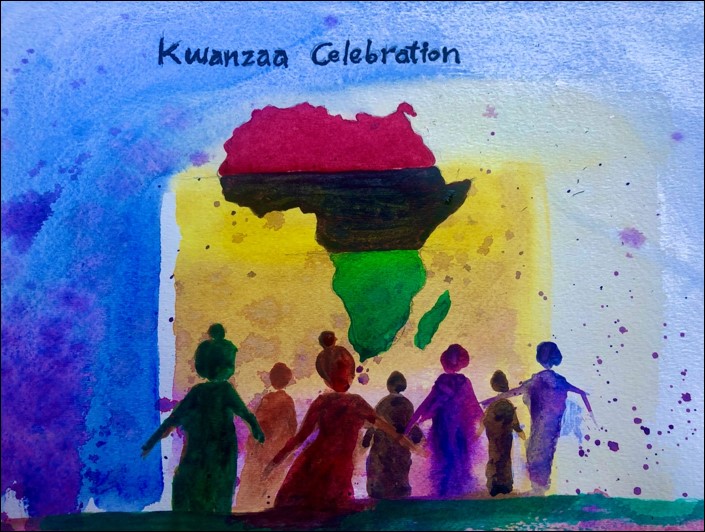By Hamid Ayoub
Kwanzaa (“first” fruit or harvest in Swahili) is not a religious holiday, but a cultural festival originating in the United States by Dr. Maulana Karenga in 1966. It is a week-long celebration (December 26th to January 1st ) created for African-Americans to welcome the first harvest in response to the over-commercialization of Christmas. It involves celebrating and thinking about the seven principles called (Nguzo Saba). These are Umoja (Unity), Kujichagulia (Self-Determination), Ujima (Collective work and responsibility), Ujamaa (Cooperative Economics), Nia (Purpose), Kuumba (Creativity) and Imani (Faith). These seven principles can be shared in social interactions through food, quizzes, games and designed art interventions. Nguzo Saba can enhance social inclusion and cultural competence such as building acceptance and respect between individual differences among cultures and serve as a reminder to be open to different cultural points of view (Humes, 2019). This project intended to be a practical engagement for participants introducing cultural principles for integrating and enhancing community wellbeing, which is a part of Canadian social determinates of health (Sonke et al., 2019).
Figure 1. Ayoub, Hamid. (2020) Kwanzaa celebration. Ottawa Ontario. Watercolour on paper. Size:11”x 14” inch
Figure 2. Ayoub, Hamid. (2020) Kinara (candelabra). Ottawa Ontario. Coloured pencil on paper. Size: 5.5"x 8.5" inch
The candelabra for Kwanzaa is called a Kinara. It has seven candles for the seven principles described below. Middle black candle represents the people, three red candles represent the blood (struggles), three green candles represent the earth and hard work (cultivation). Kwanzaa helps participants look within themselves and connect with others. This includes exchanges of forgiveness.
- Umoja (Unity) This principle highlights community strength, diversity and power.
- Kujichagulia (Self-Determination) emphasizes three basic psychological needs: autonomy, competence (motivation, high-quality performance, and wellness) (Deci, Olafsen & Ryan, 2017).
- Ujima (Collective work and responsibility) is about building, maintaining and solving community challenges together (e.g. an African proverb: “It takes a village to raise a child”). Ujima can help reduce individualistic perception, competitiveness and stress (Miller, 2017).
- Ujamaa (Cooperative Economics) refers to building partnerships, supporting shared economics, and sharing the work and wealth of the community.
- Nia (Purpose) is the self-empowerment attained through setting personal goals that are valuable for the community as a whole.
- Kuumba (Creativity) emphasizes the power of thought and imagination to energize and innovate aesthetic value that enriches cultural identities. “You can’t use up creativity. The more you use, the more you have”. ~Maya Angelou (Myers, 2019).
- Imani (Faith) is to believe and appreciate with all our heart in society including parents, mentors and leaders. “Faith is taking the first step even when you don’t see the whole staircase” – Martin Luther King (Pearson, 2013).
Kwanzaa celebration song video: link
I hope this presentation enriches your knowledge and cultural vocabulary.
Reference
Deci, E., Olafsen, A., & Ryan, R. (2017). Self-determination theory in work organizations: the state of a science. Annual Review of Organizational Psychology and Organizational Behavior, 4(1), 19-43. doi: 10.1146/annurev-orgpsych-032516-113108
Humes, D. (2019). What Is Kwanzaa and How Is It Celebrated? [Video]. Youtube: Inside Edition.
Miller, H. (2017). It takes a village to raise a child. Youth First. Retrieved 25 June 2020, from https://youthfirstinc.org/takes-village-raise-child/
Mobilemusic 4kids. (2018). Kwanzaa Celebration [Video]. Youtube.
Myers, L. (2019). 101 Powerful Creativity Quotes to Motivate and Inspire You. Retrieved 15 June 2020, from https://louisem.com/59649/101-creativity-quotes
Pearson, T. (2013). You don’t have to see the whole staircase. AADE In Practice, 1(6), 10-11.
doi: 10.1177/2325160313508269
Sonke, J., Golden T., Francois S. et al. Sonke, J., Golden, T., Francois, S., Hand, J., Chandra, A., Clemmons, L., Fakunle, D., Jackson, M.R., Magsamen, S., Rubin, V., Sams, K., Springs, S. (2019). Creating Healthy Communities through Cross-Sector Collaboration [White paper]. University of Florida Center for Arts in Medicine / ArtPlace America.
